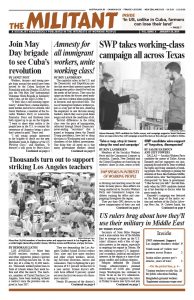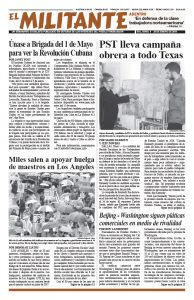Tens of thousands of garment workers have taken to the streets in Bangladesh over the past month, shutting down production. They are protesting the bosses’ refusal to fully implement a raise in the minimum wage that went into effect Dec. 1.
The government met the protests with brutal repression. One worker was killed and 50 injured Jan. 8 when cops used rubber bullets and tear gas to attack a demonstration of 5,000 in Dhaka, the capital. The next day cops in Savar, north of Dhaka, used water cannons to break up an action of 10,000. Workers blocking roads to press their demands clashed with riot cops on several occasions.
The raise in the minimum wage from 5,300 to 8,000 taka ($63 to $94) a month is the first since 2013. Workers are angry that the bosses have only given those at the absolute minimum the full raise. Workers who made over the old minimum wage were given smaller increases. The highest paid workers got a 500 taka raise, compared to 2,700 for those at the bottom. Labor federations say the new minimum is only half what’s needed to live on.
Workers won the increases after hundreds of thousands took part in a sustained round of strikes, rallies and demonstrations in 2013. In addition to wages, those mass actions protested the notoriously unsafe working conditions in the industry.
On April 24, 2013, one of the worst industrial disasters took place when Rana Plaza in Savar, housing several garment shops with thousands of employees, collapsed. With cracks visible in the outer walls of the building, workers at first refused to go into work, fearing for their safety. But after bosses threatened not to pay them they went inside. One hour later the building collapsed. The death toll rose for days. More than 1,100 workers perished.
Bosses in Bangladesh run the world’s second largest garment industry after China, employing millions of workers.

